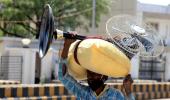All states and union territories (UTs) will have to 'strictly follow' the home ministry's latest guidelines allowing cross-country movement of stranded migrant workers, students and pilgrims during the ongoing lockdown, a senior official said on Thursday.

The Union government had on Wednesday issued fresh directives allowing states to transport stranded students, migrant labourers, tourists and pilgrims to their home states or destination by strictly following guidelines meant to contain the spread of the novel coronavirus in the country.
Asked during a press briefing if special trains and private vehicles will also be allowed to transport these people as demanded by some states and others, Joint Secretary in the Union home ministry Punya Salila Srivastava said the orders issued at present were for 'using buses and for group of persons'.
Asked if e-commerce activities will resume post May 3, when the extended lockdown is scheduled to end, Srivastava said 'we should wait' for the new orders to come.
"State governments have to keep in mind certain things while arranging their movement. All states and UTs will appoint their nodal officers who will develop standard protocols for such stranded people."
"They will also register such people and concerned states will discuss among themselves for ensuring these movements by road," Srivastava told reporters during the routine briefing on updates related to the virus outbreak and lockdown measures.
Every person will be screened and asymptomatic ones will be allowed to go.
Buses will be used for travel and these vehicles will be sanitised and social distancing rules will be strictly followed while seated in the bus, she said.
All states in transit route will allow such movement and on reaching the destination, local health officials will check the travellers and if they are not required to be kept in institutional quarantine then they will be allowed to go in home quarantine for 14 days, the official said, quoting the order issued by the ministry of home affairs (MHA).
Their (travellers) health check-up will be done regularly and monitored. Travellers will be encouraged to use the 'Aarogya setu' app, she said.
"All states will have to strictly follow these directives," Srivastava said.
The officer also briefed the media about the feedback given by the inter-ministerial central teams (IMCTs) that went to Hyderabad (Telangana's capital) and Chennai (capital of Tamil Nadu).
The teams are headed by an additional secretary-rank officer of the central government and comprises experts from health care, disaster management and other fields and are mandated to review the progress of COVID-19 containment in worst affected districts of the country.
In Hyderabad, the IMCT toured hospitals, central drug stores, shelter homes and 'mandis', Srivastava said.
It found that the state has adequate numbers of test kits and personal protective equipment (PPE) and is using an end-to-end IT (information technology) dashboard that tracks a patient from testing to discharge, she said.
The team also visited the hospital which is the state nodal centre for COVID-19.
They found all protocols are being followed there. It has a lab where 300 tests can be done everyday and about 97 per cent of cases of the state have been treated here.
The team also visited the district hospital at King Koti and found all protocols were being followed.
It was suggested that donning (area to wear PPE) and doffing areas (place to take out PPE after work) in the hospital should be placed afar.
There should be different corridors for staffers and patients. Some wards had no toilets and it was suggested that patients should not be admitted in these wards to avoid crowding in the open area, she said.
Srivastava added that the IMCT also visited the Humayun Nagar containment zone which was barricaded and house-to-house surveillance was on.
Important goods and services are being provided at door steps for which a WhatsApp group has been created comprising municipal officials and the residents of the area, she said.
In Chennai, the officer said the IMCT that toured the city suggested that social distancing norms should be strictly followed at public places and it was 'very important' to spread coronavirus awareness in fishermen's villages.
The team found that the recovery rate is much better as out of 2,058 infected, 1,168 have recovered meaning 57 per cent people have been cured, she said quoting the IMCT.
It found facilities were good for migrant labourers and the workers are satisfied with the facilities provided. Test reports are provided in 24 hours which was found commendable, she said.
To curb domestic violence, Srivastava said quoting the IMCT feedback, that women police constables were 'proactively' visiting those houses where such incidents are expected to take place.
It was suggested that in crowded places, banks and slums, strong steps should be taken for social distancing.
It is very important to increase awareness about COVID-19 in fishing villages, she said.
In hospitals relatives waiting or using lifts need to undertake social distancing very strictly and there is a need to enhance PPE usage among healthcare workers. Truck drivers should also be screened it was suggested, she said.
"We hope that with this joint effort of the Centre and states, we will be able to control the pandemic situation successfully," the officer said.











 © 2025
© 2025